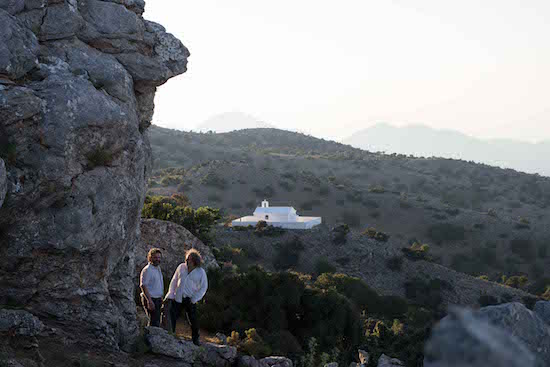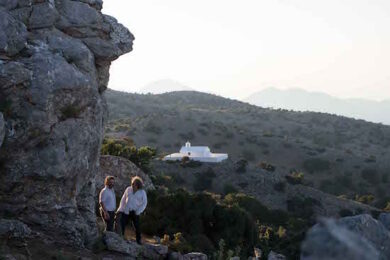"I feel like a bit of a dick with these improvisational questions," says Jim White, unclassifiable drum virtuoso and one half of Cretan folk-rock powerhouse Xylouris White. In a sense, he’s cut right to the core of what makes the duo so refreshing. "What’s improvisation, that’s like mucking around isn’t it?"
Black Peak, the follow-up to their 2014 debut Goats, is a rough-shod ride through punkish thrashings, exploratory musings and Cretan laouto legend George Xylouris’ full-throated take on the traditional music of his homeland. Crucially, there’s something bracingly unpractised and unpretentious about the way in which the pair flit between and blend these styles. There’s none of the sterile cerebralism of free improv’s clench-arsed trappings, but neither is there any of the awkward revisionism that comes when modern musicians try to jazz up their culture’s folk music. In short, Xylouris White manage to harness both the fiery potential of exploratory music and the deep-rooted resonances of folk traditions, and it’s never awkward – it just rocks.
Catching up with the Quietus mid-tour via a dodgy Skype connection in their Munich hotel room, it’s clear that neither of the pair are ones to dress up what they do. "It was like all these years we were building our tradition, our sound," says Xylouris, referring to the slow evolution of their relationship, from touring partners to friends, from friends to a band. They first met in the early ’90s, with Xylouris going on to guest with White’s instrumental noise-rock group Dirty Three. It took years of Xylouris and his wife inviting White to their home in Crete before the pair finally got together as a duo: "It always felt like it was going to happen at some point, somehow," Xylouris asserts, in his thick Cretan burr. "I started going there a lot, and that immediately gave us the opportunity to start playing together," interjects White. "All those years ago, I started listening to Cretan music, I loved it. Especially listening to Xylouris Ensemble and also Psarantonis, his father."
The shadow of Xylouris’ family looms large over the music that he makes with Jim White. His father Antonis "Psarantonis" Xylouris is a maverick of Cretan traditional music and a master of the lyra, an ancient bowed instrument that derives from the area, which he plays on the album’s final song, ‘The Feast’, and both of his uncles were well-known musicians. Yet beyond the fact that Xylouris has managed to forge his own distinct style under the shadow of these huge musical personalities, what’s perhaps more impressive is how he’s managed to do this while still remaining true to the tradition he grew up in. This, he asserts, is down to the fundamentally open-ended and fluid nature of Cretan folk music: "That’s the reason why we have a lot of young musicians now in Crete. There are tens, maybe hundreds of musicians all around the island. Lute players and lyra players, playing in that tradition that gives them the opportunity to make their own way on to that sound."
Those dazzled by the seamless oscillations between composition and improvisation on Black Peak, then, need only look to the very structures of Cretan music, which allow for passages of extemporisation within age-old dances and melodies, to see the precedent for Xylouris White’s dazzling synthesis. Giving the example of the traditional kontylies dance structure, which features on the new album, Xylouris asserts, "It has to do with the dance, how it moves, how it rolls and swings. It’s not museum music, it’s a living thing."
This fluid and frenetic style is given an extra texture of roughness with White’s equally idiosyncratic approach to the drum kit, which draws as much from high-energy punk as it does free jazz, as White explains. "I’m a rock musician, punk rock or whatever. The thing I always go for is that I like to keep it fresh. When I play a song that you’ve made up over time, you have to vary it slightly to make it feel right on the night. So when we play it could be something very new or very like something we’ve done before; you have the choice."
And it’s this choice to riff hard on Cretan music, rather than get lost in self-consciously "experimental" musings, that makes Black Peak so thrilling. Recorded straight off the back of Goats, Black Peak sees Xylouris White furrowing further forward on the interplay of their debut. The pair like to record as much as they can, often culling the album material down from hundreds of recordings. As such, the material on Black Peak was laid down on the hoof, at home and on tour all over the world, in locations such as Iceland, Rhode Island and Crete. "It’s not like we’re recording willy-nilly," White says of their prolific recording methods. "We do have a picture in mind, there’s just a lot of recording. So we have a lot of versions, takes and styles of the same song. We have to edit down and find what the album’s about, find its final shape." This off-the-cuff approach goes for their style of composition, too – on a recent West Coast tour, Xylouris absent-mindedly whistled a melody on the tour bus, and weeks later it was recorded as a song in one take that ended up on the album.
"Of course because there’s two of us, it has its own flexibility. Logistically, but in other ways too, mentally or whatever," says White. He’s mainly talking about the ease with which the duo were able to bash out and hone ideas for the album’s seven tracks, but it’s also tempting to read his words as a reference to the fluctuation between the polarities in their sound, something that’s referenced in the new album’s cover art. Featuring two roughly-drawn shapes which may be horns or summits, opposing each other yet joined at the bottom, it apparently symbolises the two mountain peaks near Xylouris’s home village in Crete – the "Black Peak" of the album’s title and the opposing peak, which is named Skinakas. As Xylouris explains, "It was a way to give a huge yell to them, from a distance all around the world – ‘Here we are! Hey, Black Peak and Skinakas, I’ll be back again!’" White goes further: "We looked for the symbol in the Minoan language, and we found a symbol that represents both. It’s a symbol that they used, that view of those mountains. Our friend spoke to an archaeologist about this, and maybe it’s just a theory, but it seemed to relate to the horizon. And also the Horns of Consecration [a symbol from the ancient Minoan culture that represents the horns of a sacred bull], which relates back to Goats as well, with what we do with our travelling and our playing and where we come from."
These sacred horns can be seen as the fluid dualities of Xylouris White: between home and foreign lands, between well-worn traditional melodies and on-the-spot improvisation, between the ancient and the modern, and perhaps even between East and West. When I bring up the seeming similarities of Xylouris White with certain eastern musical styles – for example the quarter-tone flourishes in Xylouris’s vocals or the sometimes raga-esque modes of his laouto – he asserts that it’s down to Crete’s geographical location as the tipping point where the West meets the East: "The scales we play, with the ragas, there’s a connection. Because just further from Greece is the East, the eastern Mediterranean starts from Greece, but at the same time it’s the middle of the West, so we have all that music in our life." From the punkish thrum of ‘Forging’ to the slow-burning swell of ‘The Feast’, then, Black Peak is a concentrated blast of two huge musical personalities testing the contours of musical idioms in a way that is fluid, unselfconscious and unpretentious. With regard to this organic assimilation of approaches and influences, Xylouris has a characteristically unassuming way of expressing himself: "I have listened many times to all these types of music in my whole life. All that makes your sound." With no signs of slowing down, Xylouris White look set to ascend further up those mighty peaks.
Black Peak is out now on Bella Union. Xylouris White play tonight at the Forge in London; tomorrow at Glasgow’s Poetry Club; Summerhall in Edinburgh, November 3, and the Cluny 2 in Newcastle, 5, before touring Taiwan, North America and Australia; for full details and tickets, head here



